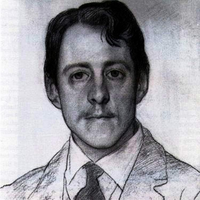Youth
When life begins anew,
And Youth, from gathering flowers,
From vague delights, rapt musings, twilight hours,
Turns restless, seeking some great deed to do,
To sum his fostered dreams; when that fresh birth
Unveils the real, the thronged and spacious Earth,
And he awakes to those more ample skies,
By other aims and by new powers possessed:
How deeply, then, his breast
Is filled with pangs of longing! how his eyes
Drink in the enchanted prospect! Fair it lies
Before him, with its plains expanding vast,
Peopled with visions, and enriched with dreams;
Dim cities, ancient forests, winding streams,
Places resounding in the famous past,
A kingdom ready to his hand!
How like a bride Life seems to stand
In welcome, and with festal robes arrayed!
He feels her loveliness pervade
And pierce him with inexplicable sweetness;
And, in her smiles delighting, and the fires
Of his own pulses, passionate soul!
Measure his strength by his desires,
And the wide future by their fleetness,
As his thought leaps to the long—distant goal.
So eagerly across that unknown span
Of years he gazes: what, to him,
Are bounds and barriers, tales of Destiny,
Death, and the fabled impotence of man?
Already, in his marching dream,
Men at his sun—like coming seem
As with an inspiration stirred, and he
To kindle with new thoughts degenerate nations,
In sordid cares immersed so long;
Thrilled with ethereal exultations
And a victorious expectancy,
Even such as swelled the breasts of Bacchus’ throng,
When that triumphal burst of joy was hurled
Upon the wondering world;
When from the storied, sacred East afar,
Down Indian gorges clothed in green,
With flower—reined tigers and with ivory car
He came, the youthful god;
Beautiful Bacchus, ivy—crowned, his hair
Blown on the wind, and flushed limbs bare,
And lips apart, and radiant eyes,
And ears that caught the coming melodies,
As wave on wave of revellers swept abroad;
Wreathed with vine—leaves, shouting, trampling onwards,
With tossed timbrel and gay tambourine.
Alas! the disenchanting years have rolled
On hearts and minds becoming cold:
Mirth is gone from us; and the world is old.
O bright new—comer, filled with thoughts of joy,
Joy to be thine amid these pleasant plains,
Know’st thou not, child, what surely coming pains
Await thee, for that eager heart’s annoy?
Misunderstanding, disappointment, tears,
Wronged love, spoiled hope, mistrust and ageing fears,
Eternal longing for one perfect friend,
And unavailing wishes without end?
Thou proud and pure of spirit, how must thou bear
To have thine infinite hates and loves confined,
Schooled, and despised? How keep unquenched and free
Mid others’ commerce and economy
Such ample visions, oft in alien air
Tamed to the measure of the common kind?
How hard for thee, swept on, for ever hurled
From hour to hour, bewildered and forlorn,
To move with clear eyes and with steps secure,
To keep the light within, fitly to scorn
These all too possible and easy goals,
Trivial ambitions of soon—sated souls.
And, patient in thy purpose, to endure
The pity and the wisdom of the world.
Vain, vain such warning to those happy ears!
Disturb not their delight! By unkind powers
Doomed to keep pace with the relentless Hours,
He, too, ere long, shall feel Earth’s glory change;
Familiar names shall take an accent strange,
A deeper meaning, a more human tone;
No more passed by, unheeded or unknown,
The things that then shall be beheld through tears.
Yet, O just Nature, thou
Who, if men’s hearts be hard, art always mild;
O fields and streams, and places undefiled,
Let your sweet airs be ever on his brow,
Remember still your child.
Thou too, O human world, if old desires,
If thoughts, not alien once, can move thee now,
Teach him not yet that idly he aspires
Where thou hast failed; not soon let it be plain,
That all who seek in thee for nobler fires,
For generous passion, spend their hopes in vain:
Lest that insidious Fate, foe of mankind,
Who ever waits upon our weakness, try
With whispers his unnerved and faltering mind,
Palsy his powers; for she has spells to dry,
Like the March blast, his blood, turn flesh to stone,
And, conjuring action with necessity,
Freeze the quick will, and make him all her own.
Come, then, as ever, like the Wind at morning!
Joyous, O Youth, in the aged world renew
Freshness to feel the eternities around it,
Rain, stars, and clouds, light and the sacred dew.
The strong sun shines above thee:
That strength, that radiance bring!
If Winter come to Winter,
When shall men hope for Spring?

